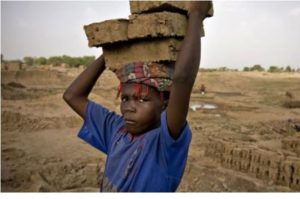Modern slavery the world’s biggest crime racket
 Modern day slavery, which has seen more than 40 million people become the victims of forced labour or unwanted marriage, is now the world’s largest organised criminal enterprise, according to a new report by the International Labour Organization (ILO).
Modern day slavery, which has seen more than 40 million people become the victims of forced labour or unwanted marriage, is now the world’s largest organised criminal enterprise, according to a new report by the International Labour Organization (ILO).
An exhaustive study of modern slavery by the Geneva-based organisation found there are over 40 million people who are victims of slavery, including 25 million in forced labour and 15 million in forced marriages – with at least 71 per cent of them comprising women and girls.
The figures represent a rise in slavery since the release of the 2017 landmark study titled ‘Global Estimates of Modern Slavery’.
The ILO report describes human trafficking as “the largest international crime industry– exceeding that of illegal drugs and arms trafficking”.
It says slavery still persists both in countries of the developing world and the industrial west.
The report says slavery is still prevalent in a variety of disguises—including human trafficking, child soldiers, forced and early child marriages, domestic servitude and migrant labour.
And migrant workers are especially vulnerable, with the investigation finding examples from orange plantations in Italy to Qatar’s construction sector.
It says millions more are at risk of being coerced into exploitative and forced labour.
The report says voluntary commitments by multinational companies are not enough.
Some countries, like the UK with its Anti-Slavery Act, Australia with its Modern Slavery Act or France with its loi de vigilance, have come to the conclusion that only binding rules work.
A recent World Health Organization (WHO) report on the health of refugees and migrants in the European Region showed that migrant workers are more likely to work long hours, in high-risk jobs and without necessary safety measures, and avoid complaining about hazardous conditions.
The report says slave workers are often not recognised by local authorities and therefore have no access to justice and affected individuals can rarely enforce their claims to pay and compensation.
To eliminate competitive advantages based on modern slavery, human trafficking and environmental pollution, human rights due diligence must go beyond national borders, the report recommends.
Former Australian President of Australia’s ACTU and now General Secretary, International Trade Union Confederation (ITUC) Sharan Burrow said that inequality and modern slavery go hand in hand for millions of people.
“Modern slavery is everywhere, from the kafala system in Saudi Arabia and the United Arab Emirates; from cattle ranches in Paraguay to fisheries in Thailand and the Philippines to agriculture in Italy,” she said.
“The supply chains of clothes, food and services consumed globally are trained with forced labour, with migrant workers and indigenous people particularly vulnerable to exploitation,” Ms Burrow said.
She said ending modern slavery is possible.
“It’s a matter of political will to deliver legislative changes and freedom of association, which will be driven by the exposure of scandal and campaigning from workers, consumers and unions. Governments need to stare down corporate pressure, people demand it,” Ms Burrow said.
The ILO report estimates that there are 1.6 million people in the Middle East living under kafala sponsorship.
These workers – mainly in the Gulf States, Jordan and Lebanon – are particularly vulnerable because they are located within private homes doing domestic jobs such as cleaning, housekeeping or child minding and are excluded from local labour regulations.
They are bound to one employer and are unable to resign, move jobs, or leave the country without consent from their sponsor, who is able to threaten deportation if their employee questions the terms of their contract, the report says.
Laurie Nowell
AMES Australia Senior Journalist












